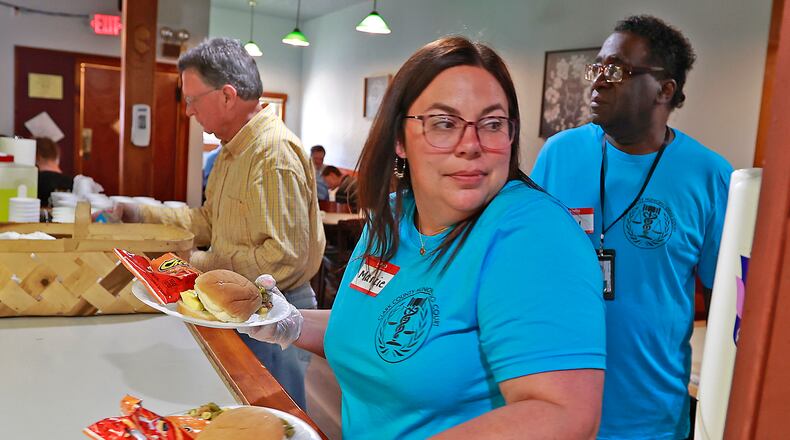Carey said the drug court addresses stresses and triggers that make a person want to use substances, giving them the tools to function in society without using drugs or returning to the criminal justice system. He said the drug court model has been proven to reduce recidivism rates.
“Our drug court is a collaboration of professionals who try to help address all of the different areas that can lead a defendant to drug use in the first place and keep them there,” Carey said. “We are trying to address not just the dependency, but oftentimes mental health, education, employment, housing, sometimes we’re addressing family issues — all of those things can cause stresses and triggers for the participants.”
Drug courts are specialized dockets that handle cases involving defendants with substance-use related charges through supervision, screening, treatment services and sanctions and incentives, according to Ohio Mental Health and Addiction Services.
May is National Drug Court month and Mental Health Awareness month, and Carey said there is often a correlation between mental illness and substance abuse. The treatment court is designed to last eight weeks for phase one, 12 weeks for phase two and 16 weeks for phases three and four — but can last longer if a participant needs more time in one phase to address something specific.
“When a person is a defendant and they have substance abuse issues, they have to voluntarily want to get better and recognize that they need help,” Carey said. “And then we try to identify all the areas that they might need help.”
The court follows state Supreme Court and National Association of Drug Court Professionals guidelines in its practices and received a preliminary certification in October, Marcie Reynolds, director of probation and deputy court administrator, said.
Reynolds said the court applied for a $900,000 grant through the Bureau of Justice Assistance after the initial certification, which will be decided later this summer. The rest of the expenses come from the court’s existing budget and a $31,000 startup grant from the city.
So far, one person in the drug court has moved from phase one to phase two, Carey said.
Reynolds said each phase requires an increasing consecutive length of time of sobriety. Phase one requires four weeks of sobriety and phase two requires eight weeks, for example.
“Say you were in week three of phase one and you would test dirty — then that’s the day we have to have you clean for four weeks before we can let you complete that phase,” Reynolds said.
Reynolds said five people are currently enrolled in the specialty docket, with two more expected to join within the next week or so. Several others have observed the court, which can hold up to 25 participants.
Being in a program with peers facing the same struggles, with more hands-on guidance, can be more beneficial than probation or jail for many people, Reynolds said.
Carey said numerous organizations and individuals are involved in the operation of the drug court, which meets on Thursday afternoons, including McKinley Hall, BrightView, the Veterans Administration for potential veteran defendants and the probation department.
The court has seen genuine growth in the people enrolled in the program, Carey said. He said with it being the only specialty docket, the court is “trying to tackle everything” they can.
“You occasionally get a step back with some people, and you may identify other issues as you progress with someone that you may have another challenge to face as they go (through the program), but I’ve been thrilled with some of the progress that I’ve seen out of our participants,” Carey said. “I can say it’s the highlight of my job every Thursday to see the things that they’ve accomplished or done.”
To celebrate National Drug Court month, members of the drug court team volunteered at the Springfield Soup Kitchen on Monday. The Drug Court is also accepting food and kitchen item donations at the Clark County Municipal Court probation department on the third floor.
About the Author
